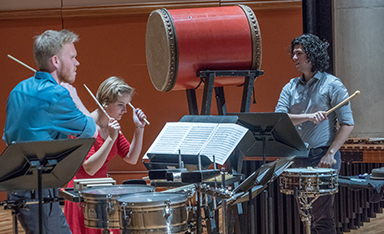Lamont offers an exceptional environment for guitarists, combining individualized instruction with world-class resources and performance opportunities. Our studio is vibrant and collaborative, where guitarists challenge and support one another in pursuit of artistic excellence. Guided by Professors Jonathan Leathwood and Laura Husbands, students engage in intensive private lessons, chamber music, performance class, large ensembles, and masterclasses with renowned guest artists. In Lamont’s guitar studio, students celebrate each other’s successes and push one another to reach new artistic heights.
6-14 guitar students at Lamont
Over 3 ensembles to participate in each quarter
300+ performance opportunities per year












